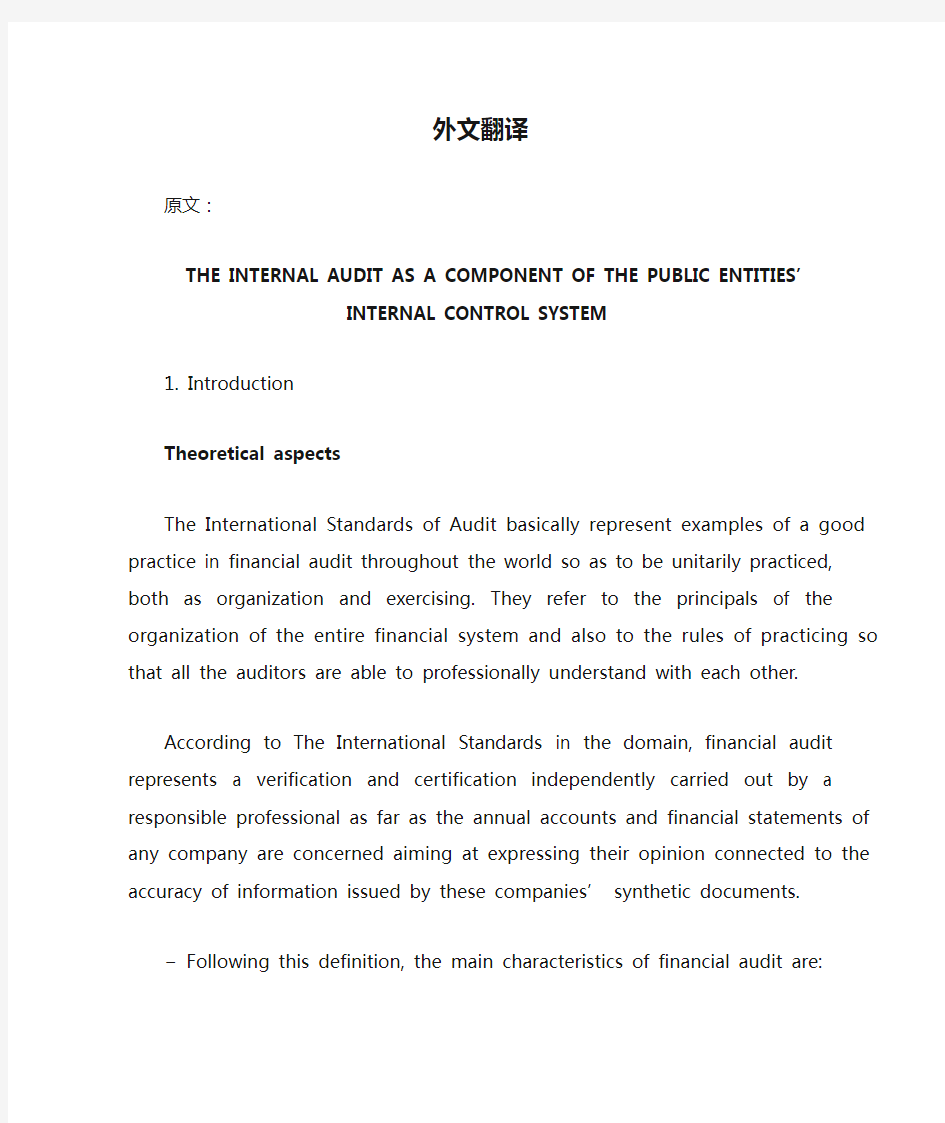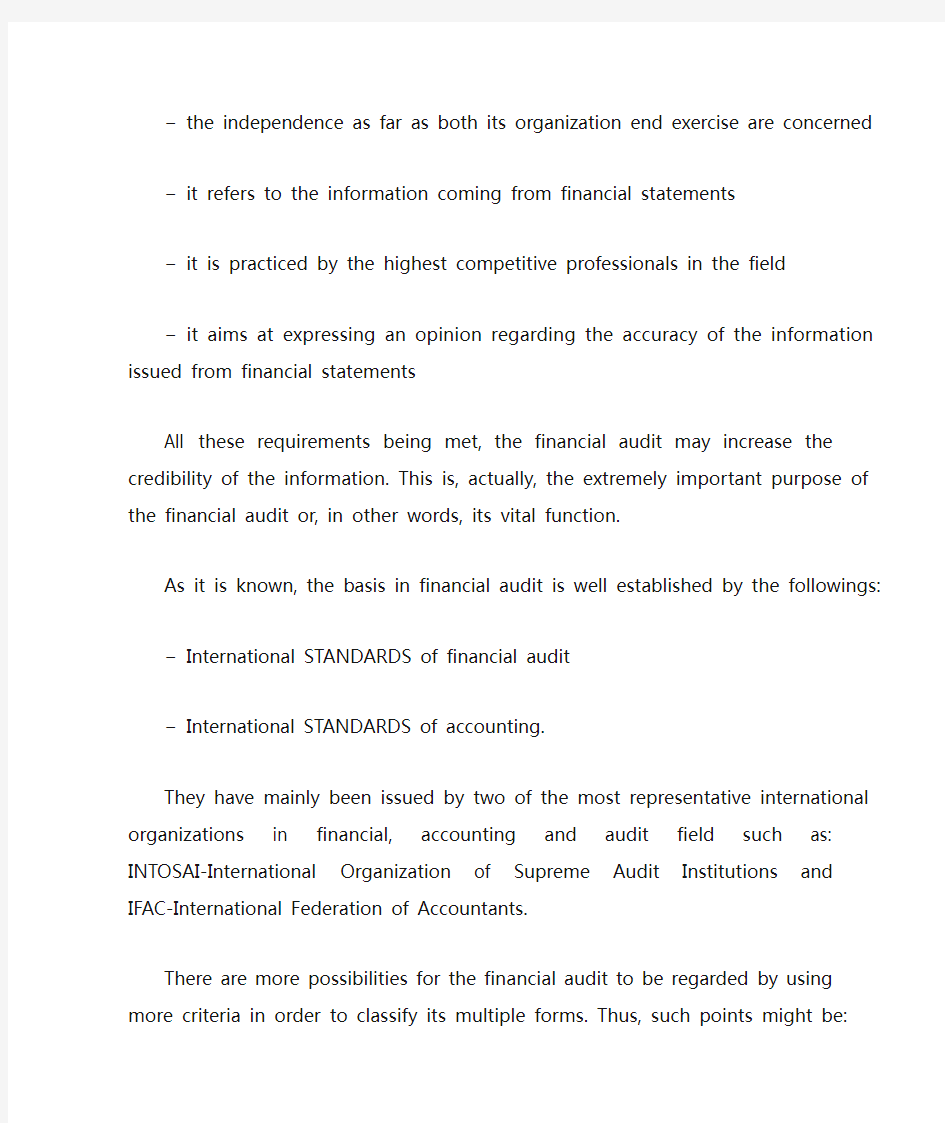作为一个公共实体的内部控制系统组件的内部审计【外文翻译】


外文翻译
原文:
THE INTERNAL AUDIT AS A COMPONENT OF THE PUBLIC ENTITIES’ INTERNAL CONTROL SYSTEM
1. Introduction
Theoretical aspects
The International Standards of Audit basically represent examples of a good practice in financial audit throughout the world so as to be unitarily practiced, both as organization and exercising. They refer to the principals of the organization of the entire financial system and also to the rules of practicing so that all the auditors are able to professionally understand with each other.
According to The International Standards in the domain, financial audit represents a verification and certification independently carried out by a responsible professional as far as the annual accounts and financial statements of any company are concerned aiming at expressing their opinion connected to the accuracy of information issued by these companies’ synthetic documents.
? Following this definition, the main characteristics of financial audit are:
? the independence as far as both its organization end exercise are concerned
? it refers to the information coming from financial statements
? it is practiced by the highest competitive professionals in the field
?it aims at expressing an opinion regarding the accuracy of the information issued from financial statements
All these requirements being met, the financial audit may increase the credibility of the information. This is, actually, the extremely important purpose of the financial audit or, in other words, its vital function.
As it is known, the basis in financial audit is well established by the followings: ? International STANDARDS of financial audit
? International STANDARDS of accounting.
They have mainly been issued by two of the most representative international organizations in financial, accounting and audit field such as: INTOSAI-International Organization of Supreme Audit Institutions and IFAC-International Federation of Accountants.
There are more possibilities for the financial audit to be regarded by using more criteria in order to classify its multiple forms. Thus, such points might be: ? the object of audit
? the organizational structure involved in its exercise
? the position towards the audited company
? the area of its activity
Regarding its object the financial audit can be public- that concerns of how public funds are made up and used. As a general rule, it is organized by the state only, both beside the Parliament, as an external audit, and inside of the public entities that is usually called “internal public audit”. There are also financial auditors privately organized as both physical and legal persons.
Taking in account the organizational structure involved in its exercise we can revealed more institutions which are in charge with such an activity as the following: ?internal audit offices that exercise audit especially for both the state’s agencies and private companies where they are organized. They serve these entities’ purpose.
? inspections of audit are organized inside of Finance Ministry in order to verify the legality of spending public funds.
? Financial Auditors Chamber which gathers all the independent auditors either physical or legal persons. They practice the financial audit activity independently for all entities.
?Court of Accounts is considered the supreme institution of financial audit being in charge with the formation and utilization of public resources. It is organized as an “of Parliament” organism. Therefore its independence is possible to be much more than of those structures belonging to Government.
According to the place of its setting-up it appears as an activity at the companies’ level, within their managerial systems and , on the other hand, like a system working
for companies from outside. Thus, it is called either internal or external audit.
The most important point of view consists in seeing financial audit as the followings: an audit of systems(when its area of activity refers to either one or all of the companies’ systems), as an audit of the performance (when are taken in account the economicness, efficiency and effectiveness of economic and financial transactions) and finally, as an audit of regularity (when it is exercised upon the way of respecting the laws and all the other rules).
Regardless of what kind of financial audit an auditor exercises it is extremely important his mission’s results to be credible. For that, the chief thing is supposed to be the independence. Even though other requirements, such as: objectivity, integrity and professionalism would be met, the lacks of the independence will lead to those conclusions and, as a result, recommendations which are always suspected to be unfair and, therefore, useless.
The internal public audit is, as The International Standards of Audit recommend, a component part of what is called the internal control system and it is set up to be subordinated to the manager of public entity. Due to this position, its independence seems to be affected. Sometimes the managers are tempted to interfere in the financial auditor activity from the position of being entitled to do that. For instance, they wish to decide upon the objectives which have to be or not allowed to be planned for control. Other times, the organization connections with other types of control inside a public entity lead to an objective temptation of involving financial auditors in different other activities than financial audit. Therefore, one may say that the internal public audit has a relative independence.
In order to increase the independence of the internal public audit, the state took a decision to subordinate it doubly, both to the public managers and to a state specially- created organism. In this way the state thought of increasing the organizational independence of internal public audit and of controlling the activity of the internal auditors as well. But how wide is, actually, its independence? We will take a notice of some aspects of internal public audit organization. The International Standards of Audit recognize a certain relativity of the independence of internal audit. When it
comes to the methods to increase its independence the standards recommend any methods but nobody ever may interfere in its exercising process. Although it seems to be normal for the state to take care of its fortune organizing an effective control on all aspects, it is also strongly necessary to take in account that an effective audit can only be obtained by setting it up as independent as, at least theoretically, it can be. The more independent the internal public is, the more effective it is and fewer wrong decisions would be taken regarding the handling of public money.
The organization of the internal public audit
According to the law and targeting to the wider independence of the internal public audit, it has been organized in the following way:
? it is the responsibility of all the managers in the public sectors to organize the activity of the internal public audit. The managers are in charge of ensuring the organizational and functional conditions inside any public entity.
?As it can be seen below, (fig.nr.1) the basis in the organization scheme of internal public audit are the compartments which are set up at the level of every public entity. They are doubly subordinated as it follows: the manager of the public entity, who directly subordinates the activity of internal auditors and, at the same time, is in charge with making sure that their activity performs properly. On the other hand there is a specially created structure which works inside of Finance Ministry being a state’s representative within public audit system that is called Central Unit of Internal Public Audit Activity Harmonization which is operatively led by The Internal Public Audit Committee.
Taking in account what the law says these organisms, from outside of the public entities, are in charge whit both administrative problems and methodological guidance of the internal public audit. Basically, the state representatives are careful and purposely watch over whether the law is respected both by the auditors and public entities.
? There is the possibility for the small public entities, which do not have enough money, to renounce of organizing internal audit and their financial statements are audited either by the compartments belonging to the hierarchical superior entity or by
the external auditors coming from Finance Ministry, namely, from the state, as well.
? The area of internal public audit refers mainly to all economical and financial activities and also to the systems of the entire entity. The financial statements are consid ered the basis of the internal public auditors’ activity.
?The activity of the internal public auditors is annually planned and always approved by the general manager. The objectives of audit are partially decided by the auditor himself but there are also demands from the entire system of management.
?The internal public auditor reports his findings, conclusions and recommendations not only to the general manager but to all the component parts of the management system (people or functional structures)
The feed-backs of the internal public organization
All the aspects above prove, in my opinion, that the requirements of the international standards are generally respected. But this assertion is very real when we talk about the statements of the law only. Although the law says, quite perfect, how to apply its statements, the reality proves to be different so far.
Thus, the interference of the state by its representatives might be considered correct, at least, in a certain way, as long as it refers to the way of respecting the law by those two parts: auditors and entities. But, as the standards say, the auditor must be free to be able to express his opinion without any confinement. Or,being controlled by the state it is supposed he can not always say why an entity or an activity goes wrong when it comes to the flaws of the law.
There are also difficulties for some managers to properly understand the importance of the independence of auditors when it comes to issuing the annual plan or to putting it in practice. Many of them consider they are right to change their employees’ plan of audit, to ask for other missions or to decide on forbidding certain previously planned actions.
In order to express an opinion upon the accuracy of the information issuing from financial statements, the internal public auditors need to be able to apply all their competences during the year. At the end of the year the financial statements have to be professionally certified before being sent to the Finance Ministry and becoming
